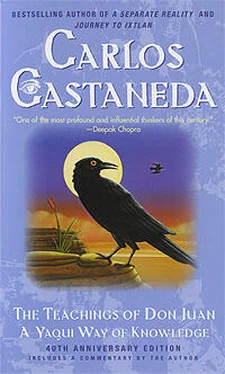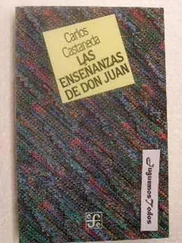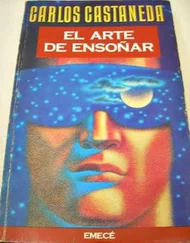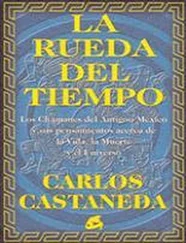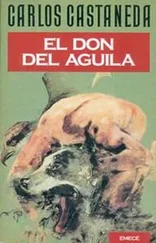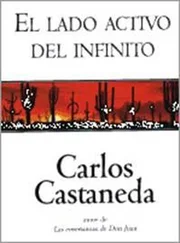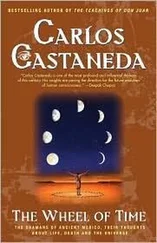'What power objects did you have?'
'Maiz-pinto, crystals and feathers.'
'What is maiz-pinto, Don Juan?'
'It is a small kernel of corn which has a streak of red colour in its middle.'
'It is a single kernel?'
'No. A brujo owns forty-eight kernels.'
'What do the kernels do, Don Juan?'
'Each one of them can kill a man by entering into his body.'
'How does a kernel enter into a human body?'
'It is a power object and its power consists, among other things, in entering into the body.'
'What does it do when it enters into the body?'
'It immerses itself in the body; it settles on the chest, or on the intestines. The man becomes ill, and unless the brujo who is tending him is stronger than the bewitcher, he will die within three months from the moment the kernel entered into his body.'
'Is there any way of curing him?'
'The only way is to suck the kernel out, but very few brujos would dare to do that. A brujo may succeed in sucking the kernel out, but unless he is powerful enough to repel it, it will get inside him and will kill him instead.'
'But how does a kernel manage to enter into someone's body?'
'To explain that I must tell you about corn witchcraft, which is one of the most powerful witchcrafts I know. The witchcraft is done by two kernels. One of them is put inside a fresh bud of a yellow flower. The flower is then set on a spot where it will come into contact with the victim: the road on which he walks every day, or any place where he is habitually present. As soon as the victim steps on the kernel, or touches it in any way, the witchcraft is done. The kernel immerses itself in the body.'
'What happens to the kernel after the man has touched it?'
'All its power goes inside the man, and the kernel is free. It becomes just another kernel. It may be left at the side of the witchcraft, or it may be swept away; it does not matter. It is better to sweep it away into the underbrush, where a bird will eat it.'
'Can a bird eat it before the man touches it?'
'No. No bird is that stupid, I assure you. The birds stay away from it.'
'Don Juan then described a very complex procedure by which such power kernels can be obtained.
'You must bear in mind that maiz-pinto is merely an instrument, not an ally,' he said. 'Once you make that distinction you will have no problem. But if you consider such tools to be supreme, you will be a fool.'
'Are the power objects as powerful as an ally?' I asked.
Don Juan laughed scornfully before answering. It seemed that he was trying hard to be patient with me.
'Maiz-pinto, crystals, and feathers are mere toys in comparison with an ally,' he said. 'These power objects are necessary only when a man does not have an ally. It was a waste of time to pursue them, especially for you. You should be trying to get an ally; when you succeed, you will understand what I am telling you now. Power objects are like a game for children.'
'Don't get me wrong, Don Juan,' I protested. 'I want to have an ally, but I also want to know everything I can. You yourself have said that knowledge is power.'
'No!' he said emphatically. 'Power rests on the kind of knowledge one holds. What is the sense of knowing things that are useless?'
In Don Juan's system of beliefs, the acquisition of an ally meant exclusively the exploration of the states of non-ordinary reality he produced in me through the use of hallucinogenic plants. He believed that by focusing on these states and omitting other aspects of the knowledge he taught I would arrive at a coherent view of the phenomena I had experienced.
I have therefore divided this book into two parts. In the first part I present selection from my field notes dealing with the states of non-ordinary reality I underwent during my apprenticeship. As I have arranged my notes to fit the continuity of the narrative, they are not always in proper chronological sequence. I never wrote my description of a state of non-ordinary reality until several days after I had experienced it, waiting until I was able to treat it calmly and objectively. My conversations with don Juan, however, were taken down as they occurred, immediately after each state of non-ordinary reality. My reports of these conversations, therefore, sometimes antedate the full description of an experience.
My field notes disclose the subjective version of what I perceived while undergoing the experience. That version is presented here just as I narrated it to Don Juan, who demanded a complete and faithful recollection of every detail and a full recounting of each experience. At the time of recording these experience, I added incidental details in an attempt to recapture the total setting of each state of non-ordinary reality. I wanted to describe the emotional impact I had experienced as completely as possible.
My field notes also reveal the content of Don Juan's system of beliefs. I have condensed long pages of questions and answers between Don Juan and myself in order to avoid reproducing the repetitiveness of conversation. But as I also want to reflect accurately the overall mood of our exchanges, I have deleted only dialogue that contributed nothing to my understanding of his way of knowledge. The information Don Juan gave me about his way of knowledge was always sporadic, and for every spurt on his part there were hours of probing on mine. Nevertheless, there were innumerable occasions on which he freely expounded his knowledge.
In the second part of this book I present a structural analysis drown exclusively from the data reported in the first part. Through my analysis I seek to support the following contentions: (1) Don Juan presented his teachings as a system of logical thought; (2) the system made sense only if examined in the light of its structural units; and (3) the system was devised to guide an apprentice to a level of conceptualization which explained the order of the phenomena he had experienced.
My notes on my first session with Don Juan are dated 23 June 1961. That was the occasion when the teachings began. I had seen him several times previously in the capacity of on observer only. At every opportunity I had asked him to teach me about peyote. He ignored my request every time, but he never completely dismissed the subject, and I interpreted his hesitancy as a possibility that he might be inclined to talk about his knowledge with more coaxing.
In this particular session he made it obvious to me that he might consider my request provided I possessed clarity of mind and purpose in reference to what I had asked him. It was impossible for me to fulfil such a condition, for I had asked him to teach me about peyote only as a means of establishing a link of communication with him. I thought his familiarity with the subject might predispose him to be more open and willing to talk, thus allowing me an entrance into his knowledge on the properties of plants. He had interpreted my request literally, however, and was concerned about my purpose in wishing to learn about peyote.
Friday, 23 June 1961
'Would you teach me about peyote, Don Juan?'
'Why would you like to undertake such learning?'
'I really would like to know about it. Is not just to want to know a good reason?'
'No! You must search in your heart and find out why a young man like you wants to undertake such a task of learning.'
'Why did you learn about it yourself, Don Juan?'
'Why do you ask that?'
'Maybe we both have the same reasons.'
'I doubt that. I am an Indian. We don't have the same paths.'
'The only reason I have is that I want to learn about it, just to know. But I assure you, Don Juan, my intentions are not bad.'
'I believe you. I've smoked you.'
Читать дальше
